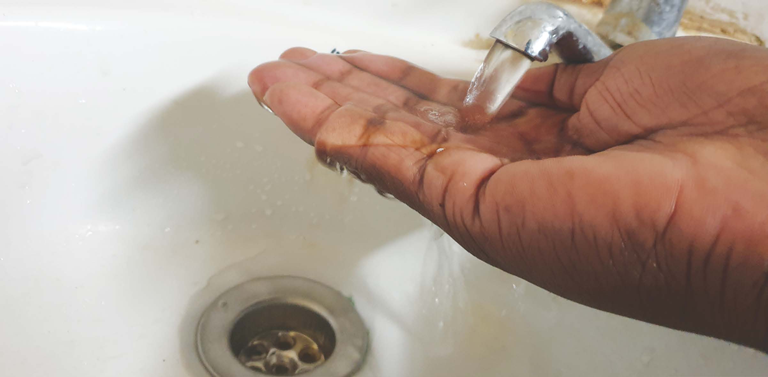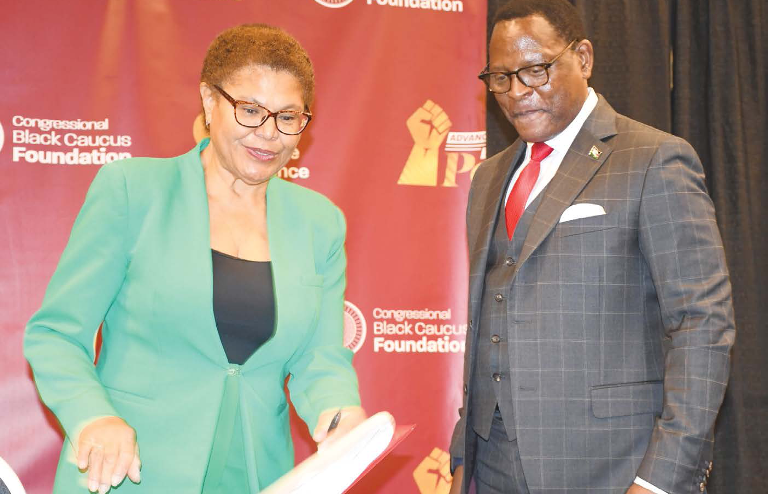Though desperate times call for desperate measures, some lodge owners in Malawi’s cities have gone too far in their quest to find solutions to potable water supply woes.
Our two months investigations found that due to water boards’ failure to supply clean and affordable water, some lodges have resorted to providing guests unsafe water from boreholes and shallow wells that they connect to the piped water system.
A tap at one of the lodges supplied by a shallow well
Unsuspecting guests such as Linda Maseko and her husband, drink this water believing it is supplied by water boards and thus safe to consume.
Malawi’s laws prohibit unregulated water drilling to protect the integrity of the country’s water resources, including harmful contamination.
At one of the lodges in Blantyre’s Mbayani Township, the water contained 800 percent of unwanted colonies of bacteria, according to a sampled specimen we collected and had it tested at the Malawi Bureau of Standards (MBS).
That level of contamination makes the water unsafe for consumption, said experts we talked to and according to World Health Organisation (WHO) standards.
Our MBS-assisted findings are validated by two studies from African Journal of Environmental Science and Technology, which sampled one of Blantyre populous townships, Bangwe in 2013 and 2018 and found that water from wells and boreholes were generally unsafe.
Our operation
Going undercover, we booked a room at one of the lodges in Blantyre City that gets its water from two shallow wells instead of Blantyre Water Board (BWB).
Chilenga: National Water Resources
Authority should be disbanded
Using two MBS-supplied containers, we collected samples from the tap in our room and took them to the bureau for microbiological testing.
MBS test results showed that the sample failed the test for safe water as heterotrophic plate count came out with 850 colony forming units (CFU) instead of the 100 CFU limit. The sample, however, was given a pass on Escherichia coli and coliform.
Interpreting the results, Malawi University of Business and Applied Sciences associate professor of environmental sciences Chikumbusko Kaonga said 850 CFU is an indication that the water is not safe for human beings as it contains dangerous bacteria.
“This water is condemned and should not be used for drinking purposes. It is not even safe for bathing due to some pores which humans have. Otherwise this water needs to be treated first before use,” he said.
Kaonga said those who might have consumed such untreated water are at high risk of suffering from various waterborne diseases such as cholera, typhoid and diarrhoea.
He said construction of shallow wells or boreholes within city boundaries is discouraged because of onsite treatment facilities such as septic tanks.
“Septic tanks have a soak way, which holds water from the septic tank. The water soaks into the ground which meets the ground water. So, if you are pumping groundwater in towns, because of septic tank issues, there is a high chance that you are pumping contaminated water,”said Kaonga.
The challenge of unregulated water sources is also prevalent in other cities as a lodger in Lilongwe was hospitalised for a week after consuming unsafe water not supplied by Lilongwe Water Board (LWB).
Linda Maseko, 31, said as she was in transit, she booked a selfcontained room with her husband at one of the lodges in the capital city.
Ignorant of the source of the water at the lodge, she drank it and used it for bathing.
“Two days later, I suffered from diarrhoea. A worker at the lodge told me that LWB disconnected [water from] the lodge due to unpaid bills and instead, management decided to drill a shallow well behind the compound and they are pumping the water into all rooms,” she said.
Maseko suspects that the water was not safe for consumption.
Problem widespread
On dangers that city residents face, studies by the African Journal of Environmental Science and Technology, showed that water sources close to market areas and within overcrowded residential areas fail to meet standards of both WHO and MBS.
The journal says there is a high risk of contamination with heavy metals and other inorganic and organic substances that could easily lead to human health complications with high or extended exposure.
Their 2013 water quality assessment study in Bangwe Township in Blantyre City, Chikumbusko Chiziwa Kaonga,
Christabel Kambala, Chikondi Mwendera and Theresa Mkandawire showed that Bangwe Clinic has consistently registered the highest number of cholera cases in Malawi.
The report said from 2004 to 2005 and November 2007 to December 2007, the clinic registered 263 and 85 cholera cases respectively, which was the highest recorded by both periurban and rural clinics in Blantyre.
This was because Bangwe is one of the most populous townships in the city having a population of 170 350 people distributed in 33 villages and 41 456 households at the time.
Thirty-six households in four villages of Nalivata, Mpingwe 1, Mpingwe and Salvation Army were randomly sampled.
Water samples were collected from 10 sources (boreholes and open wells because these are the most significant sources) and from households (storage containers) in selected villages.
The study shows that unprotected water sources of four sampled villages were subject to levels of faecal contamination in excess of WHO and MBS safe levels. Additional contamination at household level could also have resulted from the contamination of household utensils and water storage facilities.
The 2018 research, which they did by collecting samples from common boreholes, water wells and water tap kiosks in the same township from five large communities of Lilaka, Mvula, Chikunda, Namiyango and Ntopwa 2 areas, found that the water was not safe for humans.
The research focused only on the most reliable sources of potable water that were being used communally.
It found that tap water was within the MBS recommended range for drinking water except for the Mvula area which could be due to acidic discharge from dissolved metals from plumbosolvency.
“The pH [a measure of how acidic/basic water] of borehole water had a maximum of 8.84 and minimum of 4.9 in Mvula and Ntopwa 2 areas respectively and maximum pH values for well water was 8.54 with a minimum of 4.15 in Chikunda and Namiyango areas respectively. The maximum and minimum values are observed to be way out of the recommended safe range of the Malawi Bureau of Standards which already is relaxed from the WHO recommendations,” reads in part the research findings..
This risk, according to the research, is not restricted to the people from Bangwe Township but also lies on unsuspecting travelers who buy plastic bags, packaged water and cooked foods using water from the area.
Illegal drillers face penalties
National Water Resources Authority executive director Oswald Mwamsamali said it is illegal for individuals or lodges to drill a borehole or swallow well without permission from his office.
He said there are many factors such as public health standards and environmental limitations, which are considered before a borehole or well is drilled or a permit is processed.
“The driller has to be licensed, so too the contractor who comes after the borehole has been drilled.
“The company to drill a borehole submits an application for the licence which is K490 000. Borehole contractor also pays the same fee of K490 000 while the owner of the borehole needs a permit, which is K90 000,” he said.
Mwamsamali said those who drilled boreholes or shallow wells without a permit are committing an offence; hence, will be fined if found.
“We are monitoring the situation. At times we seal boreholes which have been drilled illegally,” he said.
In July, we followed up with Mwamsamali to understand what the regulator is doing on the proliferation of illegal water sources, but he did not respond despite several reminders.
Parliamentary Committee on Natural Resources and Climate Change chairperson Welani Chilenga said the country should blame the Ministry of Water and Sanitation, National Water Resources Authority and Ministry of Local Government for allowing this to happen.
“The main culprit in this issue is the Ministry of Water and Sanitation through the National Water Resources Authority. We created the authority and their duty is to monitor that no one is supposed to drill boreholes in the city and in the area where water boards are providing water. By law, no one is supposed to drill a borehole in areas where water boards are operating. It is illegal and unacceptable. The authority is supposed to implement the law. The Ministry of Water and the authority are not doing their job. Those inspections you were conducting were supposed to be done by the authority. We are living in a very dangerous world,” said Chilenga, indicating that his committee will meet next month where they will look into these issues.
The legislator is of the view that the National Water Resources Authority should be disbanded.
“During the budget session, our recommendation was that the authority should be disbanded, it is a useless authority because we already have a water department within the Ministry of Water so the water resources authority has rendered this Water Department useless,” he added.
Charles Kachelenga, who heads the Safety and Standards Section of the Director of Tourism said although permission to drill boreholes is the responsibility of the Water Resources Authority, the Tourism Act recognises that some tourism enterprises do not have supply of water from main lines. “In such circumstances, the Tourism and Hotels regulations require properties to clearly advise or notify their customers not to use the water for drinking but provide boiled, treated or bottled water instead for drinking. All operators are licensed on compliance with minimum standards which include provision of steady and regular supply or availability of potable water,” he said.
A law expert Justice Dzonzi says the Water Works Act places the responsibility of distributing water in each region or city belongs on a board of a particular zone or area, meaning every person or organisation should get water from their designated supplier. He added that nobody is allowed to extract water without their knowledge.
“The Water Works Act gave birth to all three regional water boards plus Lilongwe and Blantyre water boards, which means we do not have powers to abstract water without their approval,” he said.
The country’s water boards raised water tariffs by an average of 52 percent from November last year, a thing that hugely affected many consumers.
Malawi scoring poorly on water hygiene as cholera cases soar
Coming at a time waterborne diseases have ravaged the country this year with at least 1 736 registered cases of cholera and over 60 deaths as of August 30 2022; reverting to unprotected water sources is an affront at efforts to improve hygiene and sanitation in the country.
Many districts in the country have recorded unprecedented cases of cholera, something health experts have attributed to poor hygiene, including drinking unsafe water.
A report which the Centre for Social Accountability and Transparency (Csat), in collaboration with Lilongwe University of Agriculture and Natural Resources lecturer Henry Kankwamba, says Malawi is above its neighbours in citizen’s accessibility to water, but scores poorly in hygiene and sanitation.
In the report, Malawi’s water accessibility rate is at 68 percent; Zimbabwe ranks second at 65 percent, Zambia is third at 60 percent, Tanzania is fourth at 57 percent while Mozambique anchors the table at 55 percent.
But according to Kankwamba, Malawi should not be celebrating that her people have better access to water because most of it is not potable.
Csat sanctioned the assessment in response to growing complaints of poor water, sanitation and hygiene (Wash) services channeled through its free toll line 3056.
In February last year, our sister paper The Nation revealed that a government- sanctioned water quality audit established that even tap water supplied by the county’s five water boards is dirty and contains unacceptable chemical levels.
The post Some lodges supply contaminated water appeared first on The Nation Online.
 Moni Malawi
Moni Malawi 

